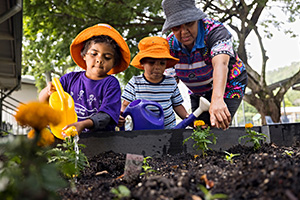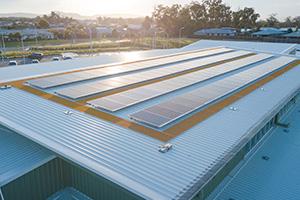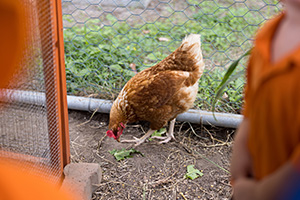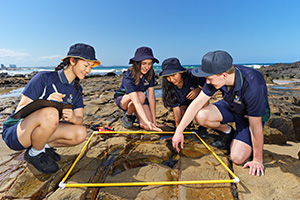 Our schools across Queensland obtain water using a range of methods. These include: dams, rivers, bores, town supply, rain water tanks and carted water. This water is used for human consumption, canteens, outside of school care, cleaning, grounds, pools, sewerage, green houses and aquariums. Additionally, some schools have on-site wastewater treatment plants that supply water for irrigation of ovals.
Our schools across Queensland obtain water using a range of methods. These include: dams, rivers, bores, town supply, rain water tanks and carted water. This water is used for human consumption, canteens, outside of school care, cleaning, grounds, pools, sewerage, green houses and aquariums. Additionally, some schools have on-site wastewater treatment plants that supply water for irrigation of ovals.
The
Australian Curriculum provides opportunities for water education across all year levels, learning areas and cross-curriculum priorities.
Learning resources
Waterwise
A Queensland Government initiative which aims to educate Queenslanders about water and its conservation. It provides curriculum-aligned educational resources for schools such as lesson plans and activities.
Australian Government Water website
Provides information related to the sustainable management of Australia's water supply for industry, the environment and communities.
Reef Authority
Offers an extensive range of curriculum aligned educational resources and programs from Prep to Year 12 including unit plans, videos, virtual learning experiences and activities designed to bring the Great Barrier Reef to your classroom.
Queensland Urban Utilities
Provides education resources such as activity sheets, videos, games, a Water Warriors incursion, Beneath the Streets curriculum-aligned workshops and a school water conservation program.
Murray Darling Basin
Teaches students about Australia's largest river system.
South East Queensland Healthy Waterways
A collaborative partnership between the Queensland Government, local councils, community organisations, industry and research groups that has a commitment to improving the health of South East Queensland waterways through effective catchment management strategies, community education and programs monitoring ecosystem health.
 Energy generated for Queensland schools comes from various fuel sources including solar systems feeding into the power supply, mains supply grid power, diesel generators, mains supply gas, bottled gas and wind turbines. This energy is used for heating, cooling, lighting, solar inverters, pool equipment, wastewater treatment plants, irrigation, IT equipment, phone systems, lifts, boom gates, security systems and electric vehicle chargers.
Energy generated for Queensland schools comes from various fuel sources including solar systems feeding into the power supply, mains supply grid power, diesel generators, mains supply gas, bottled gas and wind turbines. This energy is used for heating, cooling, lighting, solar inverters, pool equipment, wastewater treatment plants, irrigation, IT equipment, phone systems, lifts, boom gates, security systems and electric vehicle chargers.
The
Australian Curriculum provides opportunities for energy education across all year levels, learning areas and cross-curriculum priorities.
Learning resources
Queensland Treasury Climate website
Provides users with access to the Queensland Government's Net Zero Roadmap and Climate Adaptation Strategy, providing valuable insights and resources for achieving sustainable outcomes.
Solar Schools
Uses your own school's energy data to help teach students about energy generation and use. The website captures daily generation statistics from each participating school, making it a dynamic educational and research resource. Registration is required.
Energex and Ergon Energy's school education program
Provides interactive teaching resources to help Years Prep to 6 students learn about electricity and how to be safe around electrical equipment.
 Waste in Queensland schools relates to general waste and co-mingled waste, including items like recycled paper and cardboard, glass, organic waste, soft plastics and e-waste. Common methods of waste disposal include composting, reusing or repurposing, recycling and landfill.
Waste in Queensland schools relates to general waste and co-mingled waste, including items like recycled paper and cardboard, glass, organic waste, soft plastics and e-waste. Common methods of waste disposal include composting, reusing or repurposing, recycling and landfill.
The
Australian Curriculum provides opportunities for waste education across all year levels, learning areas and cross-curriculum priorities.
Waste education programs
Waste Education Queensland
Provides schools and early learning centres with free waste management and waste education resources. Additional resources include recommended waste education books and the Waste Education in Queensland schools report.
Queensland Organics Strategy and Action Plan 2022–2032
Aims to provide an overarching framework and actions for improved management of organic materials.
Schools Clean Up Day
An annual event linked to the Clean Up Australia campaign that allows schools to demonstrate care for their local environment while participating in a nationwide community activity.
Reducing waste in schools
This website, produced by the Brisbane City Council, provides schools and kindergartens with guides to reduce waste, school bin options and recycling services, waste management programs, excursion opportunities and classroom programs.
School and community education about waste
Redland City Council provides educational opportunities for schools aimed at inspiring students to better understand their environment and take action to protect it.
School Waste Minimisation Program (PDF, 416KB)
Produced by the Moreton Bay Regional Council to support schools to address waste management issues.
OzHarvest FEAST Program
OzHarvest's Food Education and Sustainability Training (FEAST) program is a curriculum-aligned program for primary and high schools (Years 5/6 and 7/8). It explores the environmental impact of food waste, as well as healthy eating, through classroom cooking activities embedded in an inquiry learning model.

Biodiversity is the variety of all life forms on earth—the different plants, animals and micro-organisms—and the ecosystems of which they are a part. Queensland is Australia's most naturally diverse state with 70% of Australia's mammals, 80% of its native birds and more than 50% of its native reptile, frogs and plant species. Our schools and
Outdoor and Environmental Education Centres are located in rainforests, savannahs, rangelands, dry tropics, wetlands and coastal environments.
The
Australian Curriculum provides opportunities for biodiversity education across all year levels, learning areas and cross-curriculum priorities.
Learning resources
Queensland Government Biodiversity
Contains information about animals, plants, wildlife habitats and much more.
Conservation of Australia's biodiversity
Produced by the Australian Department of Climate Change, Energy and Environment and Water, this website provides users with information about the national frameworks for Australia's strategies to manage nature, biodiversity conservation and threatened species.
CSIRO Biodiversity
Contains the latest information about Australia's plant, animal and marine biodiversity, and environmental monitoring programs.
Atlas of Living Australia
A collaborative, national project that aggregates biodiversity data from multiple sources and makes it freely available and usable online. Plants and animals may be searched by name or location and maps show recorded sightings.
Birdlife Australia
A national organisation that is dedicated to the conservation of Australia's native birds and their habitats. Birdlife Australia's website has a number of educational resources and links.
Earthwatch Australia
Offers training, expeditions, information and resources for students and teachers to engage with and learn about the natural world.
Natura Pacific
Explore Queensland's threatened species through documentaries, podcasts, educational materials and more. Expand your knowledge and discover new ways to support conservation efforts.
Tangalooma EcoMarines
Offers conservation programs for students and teachers and opportunities to network with other schools, connect with local businesses and learn from Traditional Custodians and industry experts.